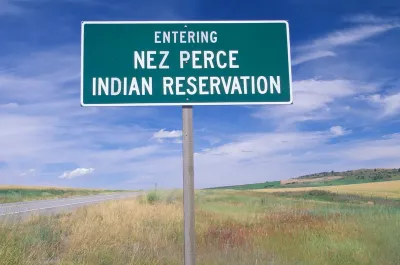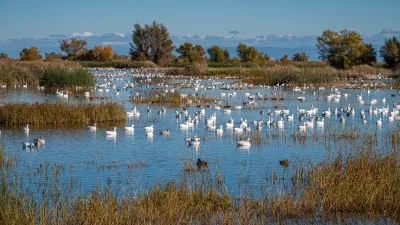In the face of federal threats to public lands and conservation efforts, indigenous groups continue to model nature-centered conservation efforts.

As federal agencies move to deregulate the exploitation of public lands, Native American leaders are developing their own plans to continue stewarding and protecting their lands.
Writing in The Conversation, Alyssa Kreikemeier notes that Native Americans were instrumental in the growth of the modern environmental movement. “Native nations regained federally recognized rights and political power at the same time as the national environmental awakening. In fact, tribal nations exercised environmental sovereignty in ways that restored federal recognition and influenced broader U.S. environmental law and policy.”
Noting the long history of Native environmental activism, Kreikemeier outlines how various tribes have taken air quality monitoring and water conservation into their own hands. “Over the decades, Native nations have partnered with federal agencies and used federal laws and funds to manage their environments. They have also built connections between tribes and nations across the continent,” Kreikemeier explains.
However, “Tribal governments have been hit hard by the shifts in federal priorities, including Trump administration funding cuts that have slowed scientific research, such as environmental monitoring and management on tribal lands.”
FULL STORY: As federal environmental priorities shift, sovereign Native American nations have their own plans

Maui's Vacation Rental Debate Turns Ugly
Verbal attacks, misinformation campaigns and fistfights plague a high-stakes debate to convert thousands of vacation rentals into long-term housing.

Planetizen Federal Action Tracker
A weekly monitor of how Trump’s orders and actions are impacting planners and planning in America.

San Francisco Suspends Traffic Calming Amidst Record Deaths
Citing “a challenging fiscal landscape,” the city will cease the program on the heels of 42 traffic deaths, including 24 pedestrians.

Defunct Pittsburgh Power Plant to Become Residential Tower
A decommissioned steam heat plant will be redeveloped into almost 100 affordable housing units.

Trump Prompts Restructuring of Transportation Research Board in “Unprecedented Overreach”
The TRB has eliminated more than half of its committees including those focused on climate, equity, and cities.

Amtrak Rolls Out New Orleans to Alabama “Mardi Gras” Train
The new service will operate morning and evening departures between Mobile and New Orleans.
Urban Design for Planners 1: Software Tools
This six-course series explores essential urban design concepts using open source software and equips planners with the tools they need to participate fully in the urban design process.
Planning for Universal Design
Learn the tools for implementing Universal Design in planning regulations.
Heyer Gruel & Associates PA
JM Goldson LLC
Custer County Colorado
City of Camden Redevelopment Agency
City of Astoria
Transportation Research & Education Center (TREC) at Portland State University
Jefferson Parish Government
Camden Redevelopment Agency
City of Claremont





























